overview
As COVID-19 is a new virus without any current vaccine or concrete medication, this unfamiliarity can lead to stress and anxiety. Steps helping to prevent transmission of the virus such as home confinement or quarantining might be necessary.
preventive measures REMINDERS
Home arrangement
- When you are confined at home, you should stay in a well-ventilated single room if possible.
- Family members should stay in different rooms whenever possible.
- Try to keep more than 1 metre apart from other person.
- Don’t share personal items like towels, lunch boxes, drinks.
- Use serving chopsticks & spoons at meal times, avoid sharing utensils.
PERSONAL HYGIENE
- Avoid touching your eyes, mouth & nose with unwashed hands.
- Keep your hands clean all the time.
- Wash your hands with soap: rub for at least 20s, then rinse with water and dry with disposable towel.
- When your hands are not visibly soiled and not greasy, perform hand hygiene with 70-80% alcohol-based handrub.
- Practice cough and sneeze etiquette.
- Cover your nose and mouth with tissue paper when sneezing and coughing, dispose the used tissue paper immediately into a covered bin and wash your hands.
- Close toilet lid when flushing.
Environmental hygiene
- Your home should be cleaned thoroughly and disinfected at least once per week.
- If any place is contaminated with mucus from the nose or mouth, vomit or excreta, clean up the visible matter and wipe the surface with disinfectant.
- Maintain drainage pipes properly and regularly pour about half a litre of water into each drain outlet to flush them.
- If there are no family members or friends who can help to dispose of household waste, wrap the waste properly for door-to-door collection by government staff.
Take Control
The pandemic has suddenly and drastically changed our ways of living, brought a sense of uncertainty and multiple challenges to the way we organize our daily lives and work. While feeling worried and anxious are normal reactions to extra-ordinary situations, it is essential to put into place self-care and team-care habits which will boost our resilience. These will enable us to meet the needs of our bodies, regain a necessary sense of control and strengthen support from other people against isolation.
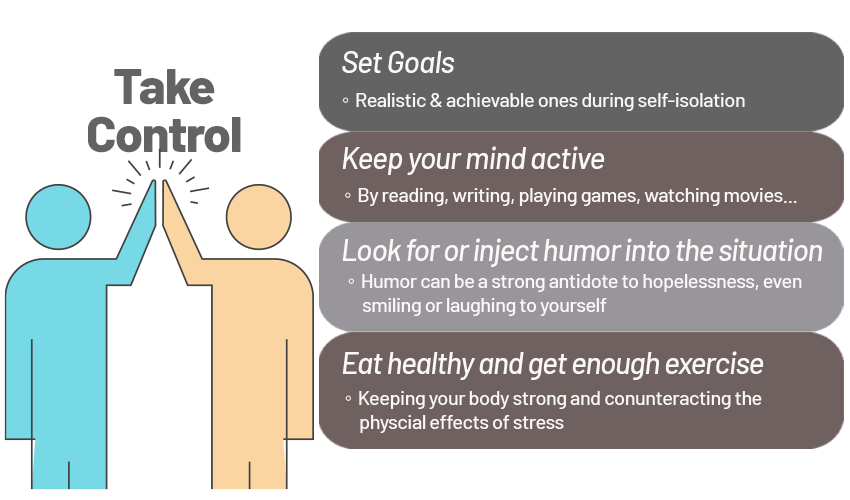
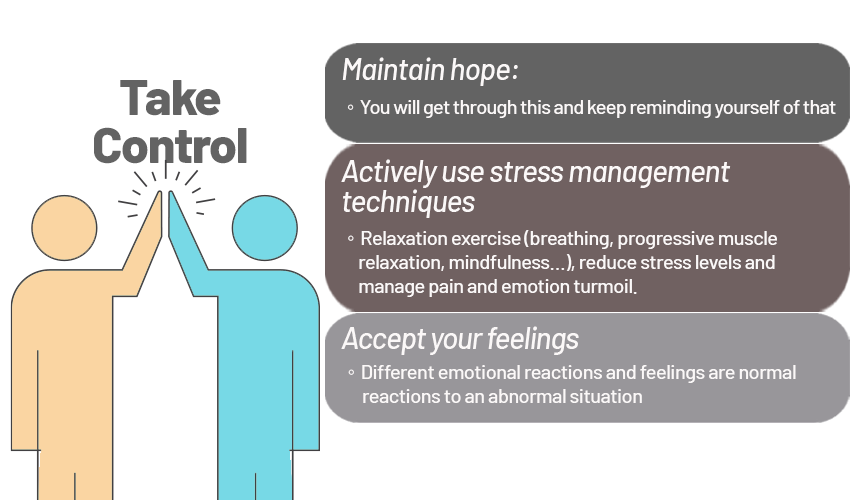
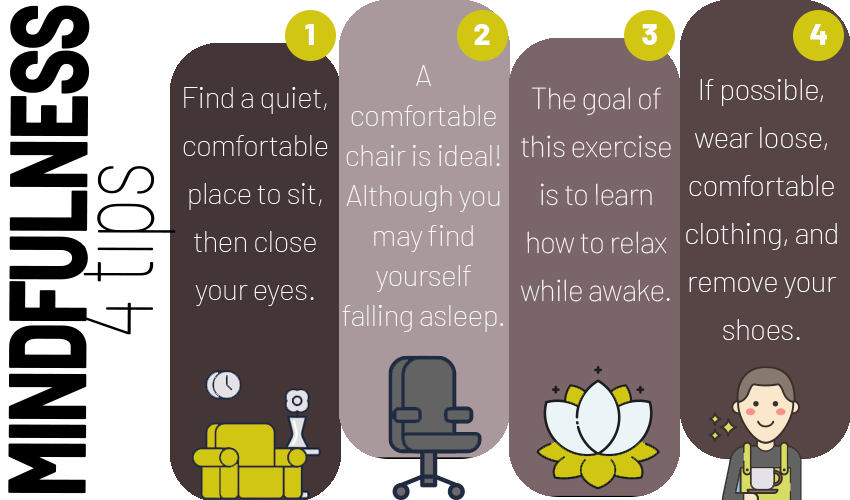
Doing more, or less than usual
ALSO can help!
THE POWER OF ACCEPTANCE
- Everyone reacts differently to stressful situations such as an infectious disease outbreak that requires social distancing, quarantine or isolation. People may feel anxiety, worry, fear, concern, uncertainty, loneliness, anger, boredom…
- They are all normal reactions.
- If you or your loved one experiences any of these negative feelings for more than two weeks, contact a professional for help.
CHECKING INFORMATION
- Stay informed with reliable sources of information: There is a reliable outbreak-related information from Centre for Health Protection (CHP), World Health Organization (WHO), the Centres for Disease Control and Prevention (CDC). During a medical consultation, don’t be afraid to ask questions.
Connect with others
- It is important to connect with your employer to give them a clear explanation about your circumstances and keep them updated on your status.
- There are many ways to virtually connect with others by using social media apps, sending emails, text messaging, and others.
- Connect with friends or loved ones by “face-to-face” talking. (click here and learn which platforms are good for you*)
ROUTINE
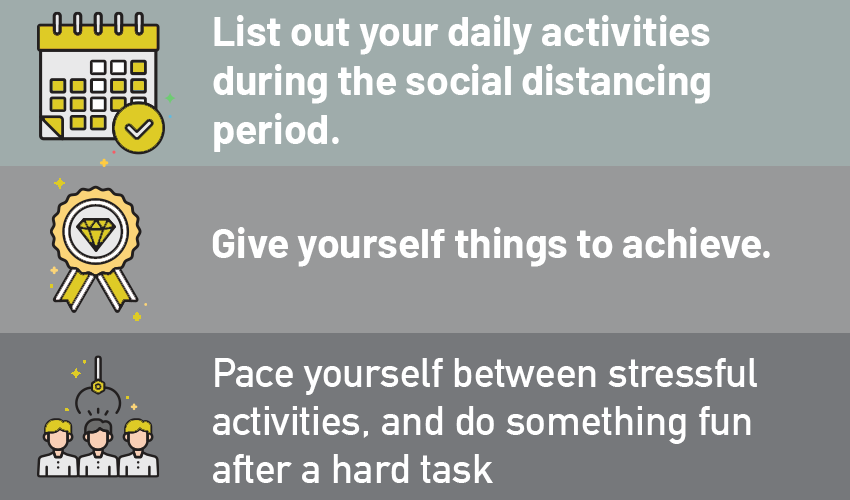
WAYS TO COPE
During the home confinement or quarantine, remember: take a breath, take a break, take care.
- You may still feel unsafe after completed confinement or quarantine, you may experience mixed emotions, including a sense of relief. The best way to end the common fear is to learn about the disease and the actual risk to others. Sharing this information will often calm fears in others and allow you to reconnect with them.
- If you or your loved ones experience symptoms of extreme stress such as trouble sleeping, problems with eating too much or too little, inability to carry out daily routine activities, or you are beginning to use drugs or alcohol to cope—ask for professional support as another way to cope.
Little things to empower yourself
ONE-MINUTE HAPPINESS DIARY
There are 1440 minutes a day. If you can take 1 minute to record something that makes you happy, you will have 30 HAPPY MEMORIES in a month. Happiness or joy can be as simple as a nice dessert, a call to your parents, helping others, starting yoga practice, resuming an old interest, a good sleep, …. LITTLE THINGS CAN HAVE A BIG IMPACT!
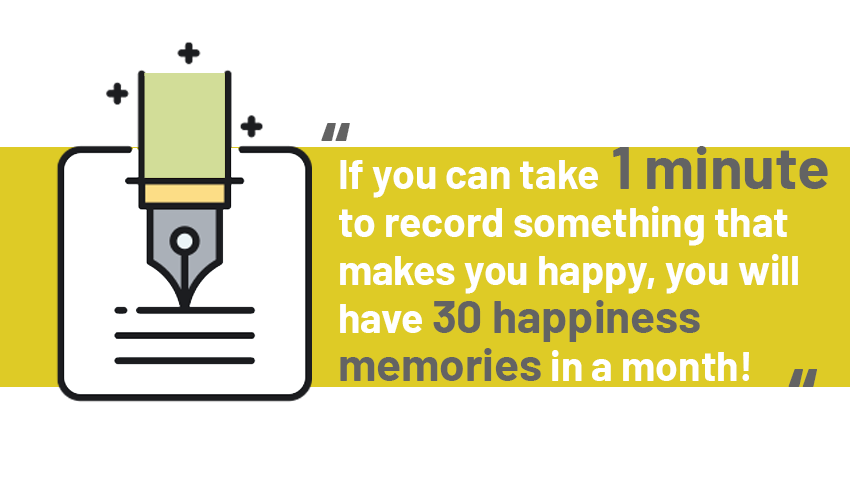 Click here to start your one-minute happiness diary.
Click here to start your one-minute happiness diary.
(For personal use, please download and save onto your device first before making your happiness diary. Have fun!)
PROGRESSIVE MUSCLE PRACTICE
Learn you how to relax your muscles through a 2-STEP process.
First step: Systematically tense particular muscle groups in your body, such as your neck and shoulders.
Second step: Release the tension and notice how your muscles feel when you relax them.
This exercise will help you to lower your overall tension and stress levels, and help you relax when you are feeling anxious. Procedures:
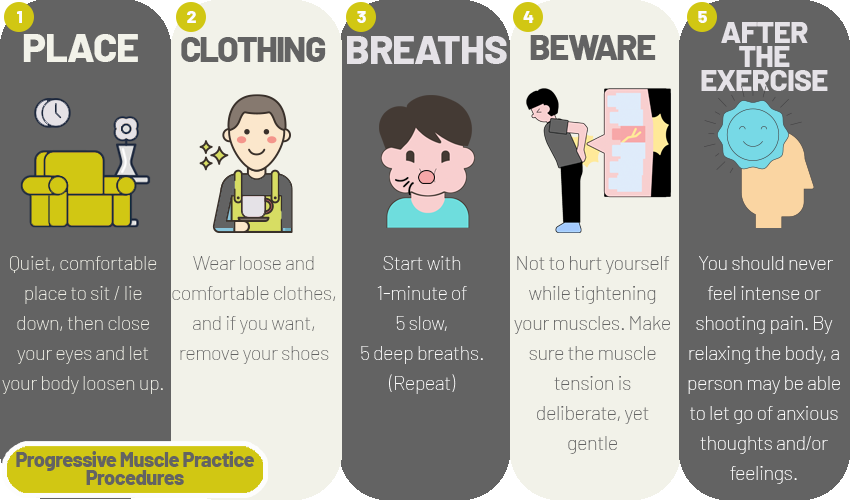
More information about Progressive Muscle Practice by Student Health Services
POSITIVE SELF-TALK
Try to treat yourself with the same kindness that you would show to a friend:
- Validate what you are feeling (“that’s an understandable feeling, given the situation”);
- Reassure yourself (“I can handle this”);
- Look towards the future (“This won’t last forever”).
3 ways to talk yourself up! 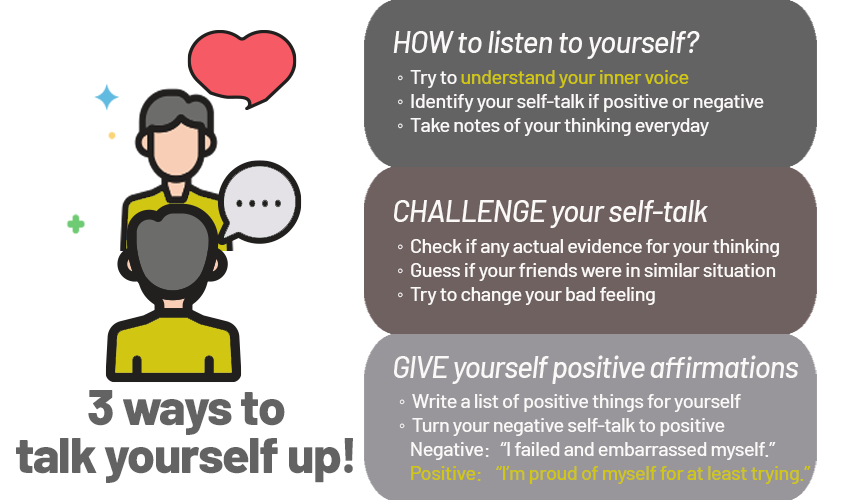
Notes:
- You may talk to the one when you stay in front of mirror and say “How are you?”, it is a way to take care of yourself. Don’t forget to tell yourself, “You have been too strong for too long. You need a moment to relax. Sometimes, it is OK to be weak”.
- Try your best to keep to your daily routine. It helps you to reduce the pressure and anxiety level. Keep your hope alive, this challenge won’t last forever!
*Information for platforms:
We are human being, used to living in groups to gain or provide support. Reaching out to people is one of the best ways to reduce anxiety, depression, loneliness, and boredom during social distancing, quarantine and isolation.
Telephone, email, text messaging and social media are commonly used to keep social connection. Here is the summary of free group chat apps (Updated@20/05/2020):
| Apps | Facebook Messenger | Teams | Slack | ||
|---|---|---|---|---|---|
| iOS/Android | Both | Both | Both | Both | Both |
| User Account | Required | Required | Required | Not necessary | Required |
| Voice | Y | Y | Y | Y | Y |
| Video calls | Y | Y | Y | Y | x |
| Instant message | Y | Y | Y | Y | Y |
| Group chat | Y | Y | Y | Y | Y |
| Group customization | Y | Y | Y | Y | x |
| File transfer | Y | Y | Y | Y | Y |
| Face to face chat | 1 to 1 | 1 to 1 | max. 32 | max. 80 | x |
| Devices | Mobile, computer, tablets | Mobile, computer, tablets | Mobile | Mobile, computer, tablets | Mobile, computer, tablets |
| Target Group | All | All | All | All | Business oriented instant messenger |

